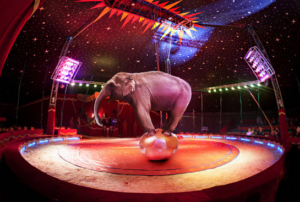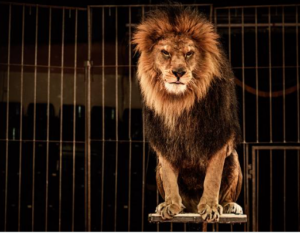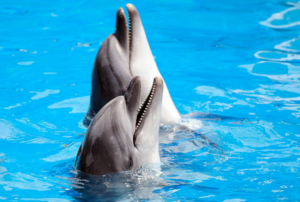From Circuses to Marine Parks

In a world where ethical considerations are becoming increasingly important, the treatment of animals in entertainment has come under intense scrutiny. From circuses to marine parks, these forms of entertainment have historically relied on the use of animals to captivate audiences. However, as society becomes more aware of the ethical implications of such practices, there is a growing movement towards more responsible and humane alternatives.
We will delve into the ethical issues surrounding animal entertainment, with a specific focus on circuses and marine parks. We will explore the impact of these practices on the animals involved and discuss the alternatives that prioritize their well-being. Let’s embark on a journey to understand how our choices as consumers of entertainment can have a significant ethical impact.
Circuses: Behind the Glitz and Glamour
Animal entertainment has a long history, with circuses and marine parks being two prominent examples. While they have provided enjoyment to countless spectators over the years, a closer look reveals a dark side that often remains hidden from the public eye.
Behind the captivating acts and dazzling displays of talent in traditional circuses lies a disturbing reality—animals are often subjected to rampant abuse and cruelty to make them perform tricks that entertain the audience.
- Harsh Training Methods: The process of training animals for circus performances can be grueling and physically punishing. Handlers may use bullhooks, whips, electric prods, and other coercive tools to control and manipulate the animals. These devices inflict pain, causing distress and fear in the animals.
- Psychological Trauma: The psychological toll on circus animals is immense. The constant pressure to perform, coupled with the fear of punishment, creates a state of chronic stress and anxiety. This psychological trauma can manifest in various behavioral issues, including aggression, withdrawal, and even self-harm.
- Violence as a Norm: The use of violence and intimidation as a means of control is deeply ingrained in many traditional circuses. This not only affects the animals’ well-being but also desensitizes circus staff and perpetuates a culture of cruelty.
In the world of circuses, animals are often confined to spaces that are grossly inadequate for their physical and psychological needs.
- Cramped Cages and Enclosures: Circus animals spend a significant portion of their lives in small, cramped cages or enclosures, barely large enough for them to turn around or stretch their limbs. These confining spaces restrict their natural movements and behaviors, leading to a range of physical health problems.
- Deprivation of Natural Behaviors: The lack of space and environmental enrichment deprives animals of the opportunity to engage in natural behaviors like foraging, exploring, and socializing. This deprivation can lead to profound frustration and boredom.
- Physical Health Issues: The restricted living conditions contribute to physical health issues such as muscle atrophy, joint problems, and obesity. Inadequate exercise and movement exacerbate these problems, making the animals vulnerable to a range of ailments.
Circus animals are nomadic by nature, constantly moving from one location to another to perform in different cities and towns. While this may seem like an adventurous life, the reality is far from glamorous.
- Transportation Stress: The process of transporting animals between locations is stressful and traumatic. They are often confined in small, uncomfortable cages within trucks or trailers for extended periods. The constant jostling and noise during transportation can lead to physical injuries and emotional distress.
- Unfamiliar Environments: Each new venue presents unfamiliar sights, sounds, and smells, which can be highly unsettling for the animals. They have little time to acclimate to these environments before being thrust into performances, further exacerbating their stress levels.
- Lack of Routine and Security: Circus animals lack a stable routine and a sense of security. This constant upheaval disrupts their natural behaviors and creates a perpetual state of instability.

Marine Parks: Beyond the Shimmering Shows
The allure of marine parks lies in their promise of close encounters with charismatic marine mammals such as dolphins, whales, and seals. However, the reality of captivity for these creatures is far from the natural environments they require for their well-being.
- Limited Space and Social Isolation: Marine mammals are inherently social beings, often living in complex social structures in the wild. In marine parks, they are typically confined to small, artificial pools that bear no resemblance to the vast oceans they call home. This confinement denies them the opportunity to engage in natural behaviors and form meaningful social bonds. As a result, they often experience profound stress, loneliness, and frustration.
- Psychological Distress: The psychological distress experienced by captive marine mammals is significant. They are unable to engage in activities like hunting, diving, and traveling that are essential to their mental and physical health. This lack of stimulation and purpose can lead to behaviors indicative of psychological distress, such as repetitive movements, self-mutilation, and aggression.
- Inadequate Enrichment: While marine parks may attempt to provide some forms of environmental enrichment, these efforts often fall short of meeting the complex needs of these animals. The limited space and repetitive routines contribute to a monotonous and unstimulating existence for captive marine mammals.
The captivating tricks and performances put on by marine mammals in marine parks are the result of intensive training methods, which raise ethical concerns.
- Rewards and Punishments: To compel marine mammals to perform, trainers often employ a system based on rewards (typically food) and punishments (withholding rewards or even disciplinary actions). This system can create a lack of choice and autonomy for these intelligent creatures. They learn to perform not out of enjoyment but to avoid negative consequences.
- Loss of Natural Behaviors: The training and performance routines take precedence over the expression of natural behaviors. As a result, marine mammals in captivity may lose the ability to engage in activities crucial to their survival and well-being, such as hunting and socializing.
- Stressful Training Environment: The training process itself can be stressful for the animals. They are constantly under pressure to perform and may experience fear, anxiety, and confusion during training sessions.
Captive marine animals face a range of health issues that can be directly attributed to their unnatural living conditions and captivity-related stress.
- Skin Problems: The chlorinated water in marine park pools can lead to skin issues, including rashes and lesions. The constant exposure to these chemicals, along with the inability to engage in natural behaviors like rubbing against rocks, exacerbates these problems.
- Dental Issues: Many marine mammals in captivity suffer from dental problems, such as worn or broken teeth. This can result from abnormal behaviors like gnawing on the concrete edges of pools or engaging in stereotypic behaviors due to boredom and stress.
- Infections: The close quarters of captivity increase the risk of disease transmission among marine mammals. Infections, such as respiratory illnesses, can spread rapidly in marine park environments, posing a threat to the animals’ health.

The Ethical Impact on Beauty
Now that we have examined the ethical issues surrounding animal entertainment, you may be wondering how this relates to the world of beauty. It’s essential to recognize that the beauty industry has, in the past, been intertwined with practices that exploit animals. Many cosmetic and skincare products have been tested on animals, and some even contained ingredients derived from animal sources. However, the tide is turning, and ethical considerations are shaping the beauty industry.
- Cruelty-Free Beauty: The cruelty-free movement in the beauty industry advocates for products that have not been tested on animals. This means that cosmetics and skincare items are developed and manufactured without subjecting animals to unnecessary harm and suffering.
- Vegan Beauty: Vegan beauty products take it a step further by excluding all animal-derived ingredients from their formulations. This ensures that no animals are exploited for the sake of beauty.
- Sustainability: Ethical beauty brands are increasingly adopting sustainable practices, not only in terms of their ingredients but also in their packaging and production processes. This shift towards sustainability is aligned with the broader ethical concerns related to the environment and animal welfare.
As consumers, our choices have the power to shape industries and drive change. When it comes to beauty products, opting for ethical choices can make a significant difference. Here are some ways you can make more ethical beauty decisions:
- Check Labels: Look for cruelty-free and vegan labels on beauty products. These certifications ensure that the products you purchase are not tested on animals and do not contain animal-derived ingredients.
- Research Brands: Investigate the practices of the beauty brands you support. Many companies now proudly display their commitment to ethical and sustainable practices on their websites and product packaging.
- Support Ethical Initiatives: Support organizations and initiatives that advocate for animal welfare and ethical beauty practices. Your voice and financial support can make a difference in advancing these causes.

Alternatives to Animal Entertainment
In our quest for ethical beauty choices, it’s also important to explore alternative forms of entertainment that do not rely on the exploitation of animals. Here are some alternatives to consider:
- Circus Reimagined: Some circuses have transitioned to animal-free performances, focusing on human acts, acrobatics, and other forms of entertainment. Supporting these circuses can help promote a cruelty-free approach to entertainment.
- Educational Outreach: Instead of viewing animals in captivity, consider visiting sanctuaries and rehabilitation centers that provide education about wildlife conservation and allow you to observe animals in a more natural and ethical setting.
- Wildlife Documentaries: Enjoy the beauty and wonder of the animal kingdom from the comfort of your home by watching wildlife documentaries. These films provide a more authentic glimpse into the lives of animals without causing harm.
The ethical impact of animal entertainment, from circuses to marine parks, extends far beyond the confines of the entertainment industry. It touches upon the choices we make as consumers, including our beauty preferences. By becoming more aware of the ethical concerns surrounding these forms of entertainment and supporting cruelty-free and sustainable beauty options, we can contribute to a more compassionate world for animals and humans alike. It’s time to make choices that reflect our values and promote a future where beauty is truly ethical.

